NURSING 602
University of Michigan
All 10 results
Sort by
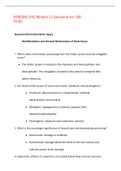
-
NURSING 602 Module 11 Questions for Self-Study,100% CORRECT
- Exam (elaborations) • 23 pages • 2021
-
- $15.49
- + learn more
NURSING 602 Module 11 Questions for Self-Study General Information Brain Injury Manifestations and General Mechanisms of Brain Injury 1. Where does information processing from the limbic system and the amygdala occur? ● The limbic system is located in the thalamus and telencephalon and diencephalon. The amygdala is located in the anterior temporal lobe within the uncus. 2. the levels of the causes of coma (structural, metabolic and psychogenic) ● Structural- above tentori...
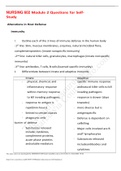
-
NURSING 602 Module 2 Questions for Self-Study,100% CORRECT
- Exam (elaborations) • 9 pages • 2021
-
- $13.49
- + learn more
NURSING 602 Module 2 Questions for Self-Study Alterations in Host Defense Immunity 1. Outline each of the 3 lines of immune defense in the human body -1st line: Skin, mucous membranes, enzymes, natural microbial flora, complement proteins (innate nonspecific immunity) -2nd line: natural killer cells, granulocytes, macrophages (innate nonspecific immunity) -3rd line: antibodies, T cells, B cells (learned specific immunity) 2. Differentiate between innate and adaptive immunity Inna...
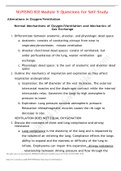
-
NURSING 602 Module 5 Questions for Self-Study,100% CORRECT
- Exam (elaborations) • 9 pages • 2021
-
- $13.49
- + learn more
NURSING 602 Module 5 Questions for Self-Study Alterations in Oxygen/Ventilation Normal Mechanisms of Oxygen/Ventilation and Mechanics of Gas Exchange 1. Differentiate between anatomic, alveolar, and physiologic dead space a. Anatomic: consists of conducting airways from nose to respiratory bronchioles – minute ventilation b. Alveolar (functional dead space)- consist of ventilated, but under perfused areas of the lung, waster ventilation – gas exchange. c. Physiologic dead space: ...
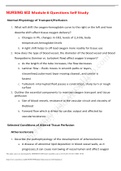
-
NURSING 602 Module 6 Questions Self Study,100% CORRECT
- Exam (elaborations) • 9 pages • 2021
-
- $14.49
- + learn more
NURSING 602 Module 6 Questions Self Study Normal Physiology of Transport/Perfusion 1. What will shift the oxygen-hemoglobin curve to the right or the left and how does the shift affect tissue oxygen delivery? a. Changes in Ph, changes in CO2, levels of 2,3-DG, body temperature, hemoglobin levels b. A right shift helps to off load oxygen more readily for tissue use 2. How does the type of blood vessel, the diameter of the blood vessel and blood flow patterns (laminar vs. turbulent flow) ...
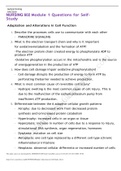
-
NURSING 602 Module 1 Questions for Self-Study,100% CORRECT
- Exam (elaborations) • 7 pages • 2021
-
- $13.49
- + learn more
NURSING 602 Module 1 Questions for Self-Study Adaptation and Alterations in Cell Function 1. Describe the processes cells use to communicate with each other - PARACRINE SIGNALING 2. What is the electron transport chain and why is it important for oxidative metabolism and the formation of ATP? -The electron protein chain created energy to phosphorylate ADP to produce ATP -Oxidative phosphorylation occurs in the mitochondria and is the source of energy generation in the production of ATP...
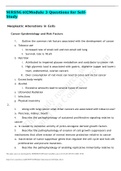
-
NURSING 602 Module 3 Questions for Self-Study,100% CORRECT
- Exam (elaborations) • 4 pages • 2021
-
- $10.49
- + learn more
NURSING 602Module 3 Questions for Self-Study Neoplastic Alterations in Cells Cancer Epidemiology and Risk Factors 1. Outline the common risk factors associated with the development of cancer a. Tobacco use i. Increased rate of small cell and non-small cell lung ii. Survival rate is 18.6% b. Nutrition i. Attributed to impaired glucose metabolism and contribute to cancer risk ii. High glycemic load is associated with gastric, digestive (upper and lower) tract, endometrial, ovarian c...
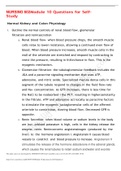
-
NURSING 602 Module 10 Questions for Self-Study,100% CORRECT
- Exam (elaborations) • 14 pages • 2021
-
- $13.49
- + learn more
NURSING 602Module 10 Questions for Self-Study Normal Kidney and Colon Physiology 1. Outline the normal controls of renal blood flow, glomerular filtration and renin secretion a. Renal blood flow- when blood pressure drops, the smooth muscle cells relax to lower resistance, allowing a continued even flow of blood. When blood pressure increases, smooth muscle cells in the wall of the arteriole are stretched and respond by contracting to resist the pressure, resulting in little chance in flo...
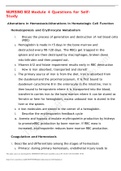
-
NURSING 602 Module 4 Questions for Self-Study,100% CORRECT
- Exam (elaborations) • 9 pages • 2021
-
- $14.49
- + learn more
NURSING 602 Module 4 Questions for Self-Study Alterations in Hemostasis/Alterations in Hematologic Cell Function Hematopoiesis and Erythrocyte Metabolism 1. Discuss the process of generation and destruction of red blood cells (RBC) a. Hemoglobin is made in 15 days in the bone marrow and destructed every 90- 120 days. The RBCs get trapped in the spleen and are then destroyed by macrophages, broken down into bilirubin and then pooped out. b. Vitamin b12 and folate impairment results ear...
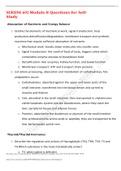
-
NURSING 602 Module 8 Questions for Self-Study,100% CORRECT
- Exam (elaborations) • 11 pages • 2021
-
- $14.49
- + learn more
NURSING 602 Module 8 Questions for Self-Study Absorption of Nutrients and Energy Balance 1. Outline the elements of mechanical work, signal transduction, heat production, detoxification/degradation, membrane transport and synthetic reactions that require sufficient absorption of nutrients a. Mechanical work- breaks down molecules into smaller ones b. Signal transduction- the smell of food of taste, triggers saliva which contains the enzyme amylase to breakdown food c. Detoxification- li...
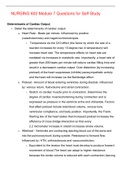
-
NURSING 602 Module 7 Questions for Self-Study,100% CORRECT
- Exam (elaborations) • 25 pages • 2021
-
- $15.49
- + learn more
NURSING 602 Module 7 Questions for Self-Study Determinants of Cardiac Output 1. Detail the determinants of cardiac output a. Heart Rate – Beats per minute. Influenced by positive (catacholamines) and negative chronotropes. i. Temperature via the Q10 effect (the factor by which the rate of a reaction increases for every 10 degree rise in temperature) will increase heart rate. The temperature effects on heart rate are mediated via increases in metabolic rate. Importantly, a heart rate o...

That summary you just bought made someone very happy. Also get paid weekly? Sell your study resources on Stuvia! Discover all about earning on Stuvia


